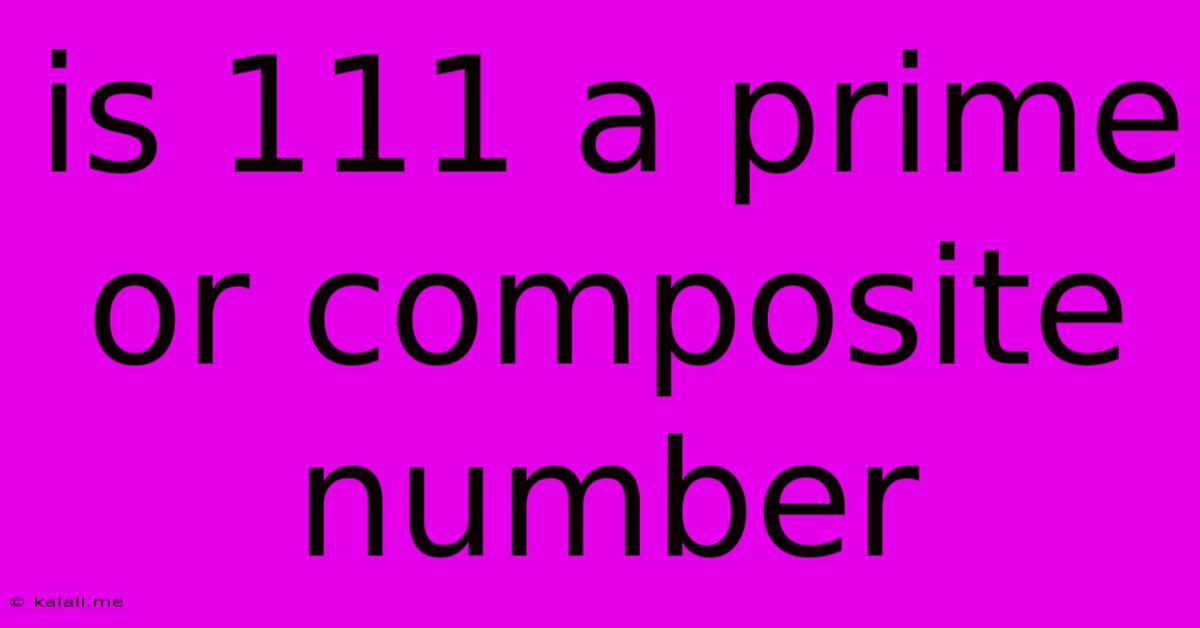Is 111 A Prime Or Composite Number
Kalali
Jun 12, 2025 · 2 min read

Table of Contents
Is 111 a Prime or Composite Number? A Simple Explanation
Determining whether a number is prime or composite is a fundamental concept in number theory. This article will delve into whether 111 is prime or composite, explaining the process and providing a clear understanding of the underlying principles. Understanding prime and composite numbers is crucial for various mathematical applications, from cryptography to advanced algorithms.
What are Prime and Composite Numbers?
A prime number is a natural number greater than 1 that has no positive divisors other than 1 and itself. Think of prime numbers as the building blocks of all other numbers. Examples include 2, 3, 5, 7, and so on.
A composite number, on the other hand, is a natural number greater than 1 that is not prime; that is, it has at least one divisor other than 1 and itself. Composite numbers can be expressed as the product of two or more prime numbers. Examples include 4 (2 x 2), 6 (2 x 3), 9 (3 x 3), and so on.
Determining if 111 is Prime or Composite
To determine if 111 is prime or composite, we need to check if it's divisible by any number other than 1 and itself. We can start by checking small prime numbers.
- Divisibility by 2: 111 is not divisible by 2 because it's an odd number.
- Divisibility by 3: A quick divisibility rule for 3 is to add the digits of the number. If the sum is divisible by 3, then the number is divisible by 3. 1 + 1 + 1 = 3, which is divisible by 3. Therefore, 111 is divisible by 3.
Since 111 is divisible by 3 (111 = 3 x 37), it means it has divisors other than 1 and itself. This makes 111 a composite number.
Factors of 111
The factors of 111 are 1, 3, 37, and 111. The fact that it has factors besides 1 and itself confirms its composite nature. Note that 3 and 37 are both prime numbers, demonstrating that composite numbers are built from prime number factors.
Conclusion:
Therefore, 111 is a composite number. It is not a prime number because it is divisible by 3 and 37. Understanding the divisibility rules and applying them systematically allows us to efficiently determine whether a number is prime or composite. This basic concept forms the foundation for more advanced mathematical explorations.
Latest Posts
Latest Posts
-
120 Sq Meters In Sq Feet
Jun 13, 2025
-
Which Of The Following Is A Secondary Pollutant
Jun 13, 2025
-
Which Of The Following Is Not A Function Of Fats
Jun 13, 2025
-
Which Is Not An Advantage Of Steel
Jun 13, 2025
-
What Are The Properties Of Materials
Jun 13, 2025
Related Post
Thank you for visiting our website which covers about Is 111 A Prime Or Composite Number . We hope the information provided has been useful to you. Feel free to contact us if you have any questions or need further assistance. See you next time and don't miss to bookmark.